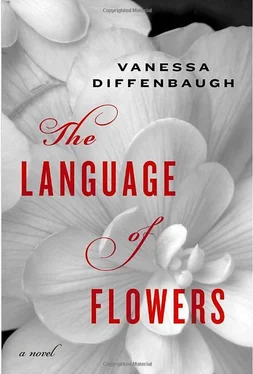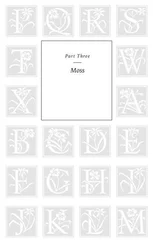I was ready to leave, too. Only half listening as Meredith and the judge debated my level of need, I manipulated the collection of broken stems on the tabletop, arranging them into the shape of a three-finned fish, a pointed crown, and then a lopsided heart. The brittle pile distracted me from the proximity of Elizabeth, less than five arm lengths away. A level-ten group home, the judge ordered, pending availability. Meredith wrote the decision on my case plan, crossing the courtroom to the bench with a thick stack of papers in her hand. The judge paused, told Meredith to add my name to all the waiting lists for transitional housing, and then signed the top sheet. When I emancipated in eight years, I would still be alone. Without stating it in precise terms, the judge’s words defined my future.
The judge cleared her throat. Meredith returned to her seat. In the silence that followed, I understood that the judge was waiting for me to look up, but I did not. With my finger, I poked a hole in the twiggy heart I’d created from the stems, pulling it open until I saw my own face reflected in the tabletop within. I was surprised by how old I looked, and also how angry. Still, I did not look up.
“Victoria,” the judge said finally. “Do you have anything to say?”
I didn’t respond. On the other side of my attorney, the county prosecutor tapped her long, polished fingernails against the table, red ovals pressed onto wrinkled hands. She wanted me to testify against Elizabeth in criminal court, but I’d refused.
I stood up slowly. From my pockets I pulled handfuls of red carnations, browning heads I’d plucked from a holiday bouquet in the hospital gift shop. Over two months after the night of the fire, I was still in the hospital, moved from the burn unit to the psychiatric ward until Meredith could find a placement for me.
I ducked under the table and crossed the courtroom.
“I want you to think about the consequences of refusing to testify,” the judge said as I stood before her. “This is more than just about standing up for yourself, and standing up for justice. This is about protecting other children.”
The adults in the room believed Elizabeth to be a threat. I almost laughed, the idea was so absurd. But I knew if I laughed I would start to cry, and if I started to cry, I might never stop.
Instead, I piled the red carnations on the bench. My heart breaks . It was the first time I’d ever given a flower to someone who didn’t understand the meaning. The gift felt subversive and strangely powerful. As I turned to go, Elizabeth stood, taking in the meaning of the flowers. Our bodies faced each other, and in the brief, quiet moment, the energy between us was as hot as the fire that had torn us apart.
I started to run. The judge pounded the gavel; Meredith called me back. Throwing open the doors of the courtroom, I raced down six flights of stairs, pushing open an emergency exit and walking outside. I stopped in the bright afternoon light. It didn’t matter which way I ran. Meredith would catch me. She would drive me back to the hospital, place me in a group home, or lock me in a detention center. For eight years, I would move from one placement to the next, whenever she came for me. Then, on my eighteenth birthday, I would emancipate, and I would be alone.
I shivered. It was a cold December day, the bright blue sky deceptive. I lay down on the ground where I stood, pressing my cheek against the warm cement.
I wanted to go home.
Ten years hadpassed, and still, Elizabeth wanted me.
Her letter, folded into a small square and tucked inside my bra, pressed into my skin as I worked beside Marlena that evening. I let you down , she’d written. I’ve never stopped being sorry, either . And then, at the very bottom, just above her name: Please, please, come home . Two or three times an hour I removed and reread the short sentences, until I’d memorized not only the words on the page but the exact shape of every letter. Marlena didn’t ask, just worked harder to make up for my distraction.
I would go to Elizabeth. I had decided this the moment I read her letter, sitting on the curb beside Renata. Standing up, I’d meant to walk straight to my car, drive immediately over the bridge and through the countryside to her vineyard. But instead I’d seen Marlena working through the window, stopped in to rearrange a bouquet, then paused and reached for another. Hours passed. We had an anniversary party the following day, followed by two weddings, back-to-back. The fall had officially become as busy as the summer months had been, full of demanding, superstitious brides who would rather marry on a Sunday in late autumn than use another florist. They were my least favorite. Not wealthy enough to have simply outbid other brides for the summer months and planned extravagant weddings with grace and gratitude but wealthy enough to run in the same circles and feel the grief of constant comparison. Fall brides were insecure, and the men they were marrying overindulgent. In the past month, Marlena and I had been called in for last-minute consultations for three different brides, in which everything we had planned was scrapped and we started over the day before a wedding.
But it was more than just the demands of our schedule that kept me idling beside Marlena. The thrill of knowing that Elizabeth still wanted me had dulled the pain of the past decade, dulled even my constant aching for my daughter. As long as I did not go to her, the promise of Elizabeth’s letter remained intact. If I knocked on her door, I risked coming face-to-face with a woman different from the one I remembered—older, without a doubt, but perhaps also sadder or angrier—and this felt like too great of a risk to take.
That night I slept fitfully, waking every few hours with the urge to drive to Elizabeth’s. But by morning, the pull of the vineyard had weakened. I would wait a week, I decided, two at the most, and then I would go to her, fully prepared for whatever I would find.
I had showered and dressed when the phone rang. Caroline. I’d been expecting her call. During our consultation, she hadn’t known what she wanted from a florist or from a relationship, and got weepy every time I asked a question she couldn’t answer, which was anytime I asked anything more complicated than her name or the date of her wedding. I should have turned her away, but I liked her fiancé, Mark, which I suppose was why I kept the job; he teased her in a way that somehow sounded encouraging instead of belittling.
I answered her call on the first ring. Just as I was trying to decide whether to tell her to come over or lie and say I was busy, I walked through the bedroom and saw her sitting on the curb across the street. She looked up at me, Mark at her side. Her fists were clenched, but she opened one hand slowly to wave. I slid open the window and hung up the phone.
“Okay, give me a minute,” I said, just as Natalya had the first time I knocked on the door, and, like Natalya, I took my time. I went into the kitchen and made a cup of tea, poached eggs, and toast. If we were going to start over on the bouquets—and I knew we were—I would likely be working the next twenty-four hours straight. I took my time eating and drank two glasses of milk before descending the stairs.
Caroline hugged me when I opened the door. She was probably almost thirty but wore her hair in two long braids, and the hairstyle made her appear much younger. When she sat down at the table across from me, I saw that her blue eyes were watery.
“The wedding’s tomorrow,” she said, as if this fact had somehow escaped me. “And I think I got it all wrong.” She gasped and pounded her heart with a flat palm.
Читать дальше












